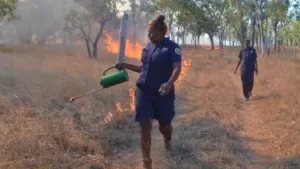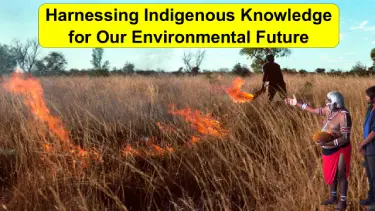Description
Explore how Indigenous knowledge can reshape Australia’s environmental policies, driving sustainability and preserving ecosystems.
Harnessing Indigenous Knowledge for Australia’s Environmental Future
Introduction
Australia faces significant environmental challenges, including climate change, biodiversity loss, land degradation, and water scarcity. Despite numerous policies and efforts, these issues persist, threatening the nation’s ecological future.
While traditional policies have had limited success, Indigenous knowledge offers an underutilized resource that has sustained ecosystems for millennia. The failure to fully integrate this knowledge into modern environmental management poses a critical oversight.
This article explores how incorporating Indigenous knowledge into Australia’s environmental policies can provide innovative solutions to current environmental issues, ensuring a sustainable future for all.
1. Understanding Indigenous Knowledge
Definition and Scope
 Indigenous knowledge, often referred to as Traditional Ecological Knowledge (TEK), is the body of knowledge, practices, and beliefs developed by Indigenous communities through generations of living in close connection with the environment. It encompasses a holistic understanding of natural systems, integrating ecological, spiritual, and cultural dimensions.
Indigenous knowledge, often referred to as Traditional Ecological Knowledge (TEK), is the body of knowledge, practices, and beliefs developed by Indigenous communities through generations of living in close connection with the environment. It encompasses a holistic understanding of natural systems, integrating ecological, spiritual, and cultural dimensions.
TEK is characterized by its adaptability, sustainability, and deep understanding of local ecosystems. Unlike Western scientific approaches, which often compartmentalize nature, Indigenous knowledge views the environment as an interconnected web where humans are an integral part.
Cultural and Spiritual Connection to Land
For Indigenous Australians, the land is more than a resource; it is a living entity with which they share a reciprocal relationship. This connection is deeply embedded in their cultural practices, laws, and spirituality. The land is considered a source of identity, sustenance, and responsibility.
This spiritual connection fosters a stewardship mindset, where managing the land sustainably is not just a practical necessity but a sacred duty. This contrasts with many modern approaches that prioritize economic gain over ecological balance.
Traditional Ecological Knowledge (TEK)
TEK includes a range of practices such as controlled burning, sustainable hunting, water management, and seasonal harvesting. These practices are guided by an intricate understanding of local ecosystems, weather patterns, and species behaviours. Indigenous knowledge also emphasizes the importance of supporting biodiversity, recognizing the interdependence of all living things.
For example, the practice of “cultural burning” involves using fire to manage vegetation, reduce fuel loads, and prevent large-scale bushfires. This method, refined over thousands of years, enhances biodiversity by promoting the growth of native species and creating habitats for wildlife.
2. Current Environmental Policies in Australia
Overview of Existing Environmental Policies
 Australia’s environmental policies aim to address a range of issues, including climate change, water management, biodiversity conservation, and land use. Key policies include the National Strategy for Ecologically Sustainable Development, the Environment Protection and Biodiversity Conservation Act, and various state-level initiatives.
Australia’s environmental policies aim to address a range of issues, including climate change, water management, biodiversity conservation, and land use. Key policies include the National Strategy for Ecologically Sustainable Development, the Environment Protection and Biodiversity Conservation Act, and various state-level initiatives.
However, these policies often rely on top-down approaches, with limited input from Indigenous communities. While they address some environmental challenges, they tend to prioritize economic development and resource extraction, sometimes at the expense of long-term sustainability.
Gaps and Shortcomings
Current policies often lack an integrated approach, focusing on isolated issues rather than the interconnected nature of ecosystems. This has led to fragmented efforts that do not address the root causes of environmental degradation.
Moreover, there is a significant gap in the inclusion of Indigenous perspectives. While some policies acknowledge the importance of Indigenous knowledge, they rarely give meaningful opportunities for Indigenous communities to lead or co-manage environmental initiatives. This exclusion not only undermines the effectiveness of environmental policies but also perpetuates historical injustices.
Inclusion of Indigenous Perspectives in Policy
In recent years, there has been a growing recognition of the value of Indigenous knowledge in environmental management. Initiatives such as the Indigenous Ranger Program and the Indigenous Protected Areas (IPAs) have begun to integrate Indigenous knowledge into conservation efforts.
However, these initiatives are often limited in scope and funding. For Indigenous knowledge to be fully integrated into environmental policy, it must be recognized as an equal partner to Western scientific approaches. This requires structural changes in policy development, where Indigenous voices are not just consulted but actively involved in decision-making processes.
3. Case Studies: Successes of Indigenous Knowledge
Fire Management Practices (Cultural Burning)
Cultural burning, also known as cool burning, is an ancient fire management technique used by Indigenous Australians. It involves the controlled application of fire to the landscape to reduce fuel loads, promote biodiversity, and prevent large-scale wildfires.
Case studies from Northern Australia show the effectiveness of cultural burning in reducing the intensity and frequency of bushfires. By burning small, controlled patches during cooler months, Indigenous communities can manage the landscape in a way that mimics natural fire cycles, supporting the regeneration of native plants and creating habitats for wildlife.
For example, the Western Arnhem Land Fire Abatement (WALFA) project has successfully combined Indigenous knowledge with modern fire management techniques to reduce carbon emissions, enhance biodiversity, and protect cultural heritage.
Water Management Techniques
Indigenous Australians have developed sophisticated water management systems that ensure the sustainable use of this precious resource. These practices include the construction of fish traps, the creation of wetland gardens, and the careful management of waterholes.
One notable example is the Budj Bim Cultural Landscape in Victoria, where the Gunditjmara people constructed an extensive aquaculture system over 6,600 years ago. This system, which includes channels, weirs, and ponds, was used to farm eels and provided a reliable food source for the community.
Such traditional water management practices offer valuable lessons for modern water conservation efforts, particularly in a country as water scarce as Australia.
Sustainable Land Management
Indigenous land management practices are based on a deep understanding of the local environment and its cycles. These practices include sustainable hunting and gathering, soil conservation, and the protection of sacred sites.
For instance, the Martu people of Western Australia have used their traditional knowledge to manage the Great Sandy Desert sustainably for thousands of years. By practicing rotational hunting, controlled burning, and selective harvesting, they have supported the health of the ecosystem while ensuring a stable food supply.
These sustainable land management practices can inform contemporary approaches to agriculture, conservation, and land restoration, offering more sustainable alternatives to industrial-scale farming and land use.
4. Challenges in Integrating Indigenous Knowledge
Legal and Political Barriers
One of the primary challenges in integrating Indigenous knowledge into environmental policy is the complex legal and political landscape. Land rights issues, unresolved Native Title claims, and conflicting land use priorities often hinder the full recognition and application of Indigenous knowledge.
Moreover, political resistance to Indigenous-led initiatives can prevent the scaling up of successful projects. There is a need for legal reforms that recognize Indigenous land ownership and management rights, as well as political will to support Indigenous-led environmental initiatives.
Recognition and Respect for Indigenous Knowledge
Despite growing awareness of the value of Indigenous knowledge, there is still a lack of respect and recognition for it within mainstream environmental science and policy. This can lead to tokenistic inclusion, where Indigenous knowledge is acknowledged but not fully integrated into decision-making processes.
To overcome this, there needs to be a shift in how Indigenous knowledge is perceived and valued. This includes providing opportunities for Indigenous knowledge holders to share their expertise, ensuring that their contributions are acknowledged and respected, and creating spaces where Indigenous and non-Indigenous knowledge systems can coexist and complement each other.
Collaboration and Co-Management
True collaboration between Indigenous communities and government agencies needs more than just consultation; it requires co-management. This means sharing decision-making power, resources, and responsibilities.
Successful co-management models, such as those seen in Indigenous Protected Areas (IPAs), show the benefits of this approach. However, scaling up these models requires addressing power imbalances, building trust, and fostering long-term partnerships.
5. Benefits of Integrating Indigenous Knowledge
Enhanced Environmental Outcomes
Integrating Indigenous knowledge into environmental policy can lead to more effective and sustainable outcomes. Indigenous practices, such as cultural burning and sustainable land management, have been proven to enhance biodiversity, reduce greenhouse gas emissions, and restore degraded landscapes.
By combining Indigenous knowledge with Western science, policymakers can develop more holistic and adaptive approaches to environmental management. This integration can also lead to the creation of more resilient ecosystems that are better equipped to withstand the impacts of climate change.
Strengthening Indigenous Communities
Incorporating Indigenous knowledge into environmental policy can also strengthen Indigenous communities by recognizing and valuing their expertise. This can lead to increased employment opportunities, greater cultural preservation, and enhanced community well-being.
For example, the Indigenous Ranger Program has provided meaningful employment for thousands of Indigenous Australians, allowing them to manage their traditional lands while preserving their cultural heritage.
Broader Societal Benefits
The benefits of integrating Indigenous knowledge extend beyond environmental outcomes and Indigenous communities. By adopting a more inclusive approach to environmental management, Australia can foster greater social cohesion, equity, and reconciliation.
Moreover, the broader society can learn from Indigenous approaches to sustainability, which emphasize balance, respect for nature, and long-term thinking. These principles are increasingly relevant in a world facing environmental crises and resource scarcity.
6. Recommendations for Policy Integration
Creating Inclusive Policy Frameworks
To fully integrate Indigenous knowledge into environmental policy, there needs to be a shift towards more inclusive policy frameworks. This involves creating mechanisms for Indigenous participation at all levels of decision-making, from local to national.
Policymakers should also work towards recognizing and respecting Indigenous land rights, ensuring that Indigenous communities have the legal and political support they need to manage their lands according to their traditional practices.
Empowering Indigenous Voices
Empowering Indigenous voices requires more than just consultation; it requires giving Indigenous communities the resources, authority, and autonomy to lead environmental initiatives. This can be achieved through increased funding for Indigenous-led projects, capacity-building programs, and the establishment of co-management arrangements.
Additionally, non-Indigenous stakeholders, including government agencies, NGOs, and the private sector, should actively look to learn from and collaborate with Indigenous knowledge holders.
Monitoring and Evaluation
To ensure that the integration of Indigenous knowledge leads to positive outcomes, there must be robust monitoring and evaluation frameworks in place. These frameworks should be developed in collaboration with Indigenous communities and should include both qualitative and quantitative measures.
Monitoring and evaluation should also be ongoing, allowing for adaptive management and continuous improvement. By regularly assessing the impact of Indigenous knowledge on environmental policy, policymakers can ensure that these practices are being effectively implemented and are leading to the desired outcomes.
7. Conclusion
Summary of Key Points
Integrating Indigenous knowledge into Australia’s environmental policies offers a pathway to more sustainable and effective environmental management. By recognizing the value of Traditional Ecological Knowledge and creating inclusive policy frameworks, Australia can address its environmental challenges while honouring the wisdom and contributions of its Indigenous peoples.
The Future of Environmental Policy in Australia
As Australia grapples with the escalating impacts of climate change and environmental degradation, the integration of Indigenous knowledge is a crucial step towards a more sustainable future. This requires not only policy changes but also a broader cultural shift towards valuing and respecting Indigenous ways of knowing.
Call to Action
Policymakers, environmentalists, and the broader public must advocate for the integration of Indigenous knowledge into environmental governance. By supporting Indigenous-led initiatives, pushing for legal reforms, and fostering collaboration between Indigenous and non-Indigenous stakeholders, we can ensure a healthier and more resilient environment for future generations.
Thought-Provoking Question
How can we better integrate Indigenous knowledge into our everyday practices to ensure a sustainable future for all Australians?
Call to Action
Share this article to raise awareness about the importance of Indigenous knowledge in environmental policy. Together, we can advocate for a more inclusive and sustainable approach to environmental management.
References and Further Reading
Caring for Country: https://aiatsis.gov.au/sites/default/files/research_pub/benefits-cfc_0_2.pdf
Firesticks Alliance: https://firesticks.org.au/
The Budj Bim Cultural Landscape: https://www.budjbim.com.au/
Indigenous Ranger Program: https://www.firstnationscleanenergy.org.au/what_is_the_indigenous_rangers_program

